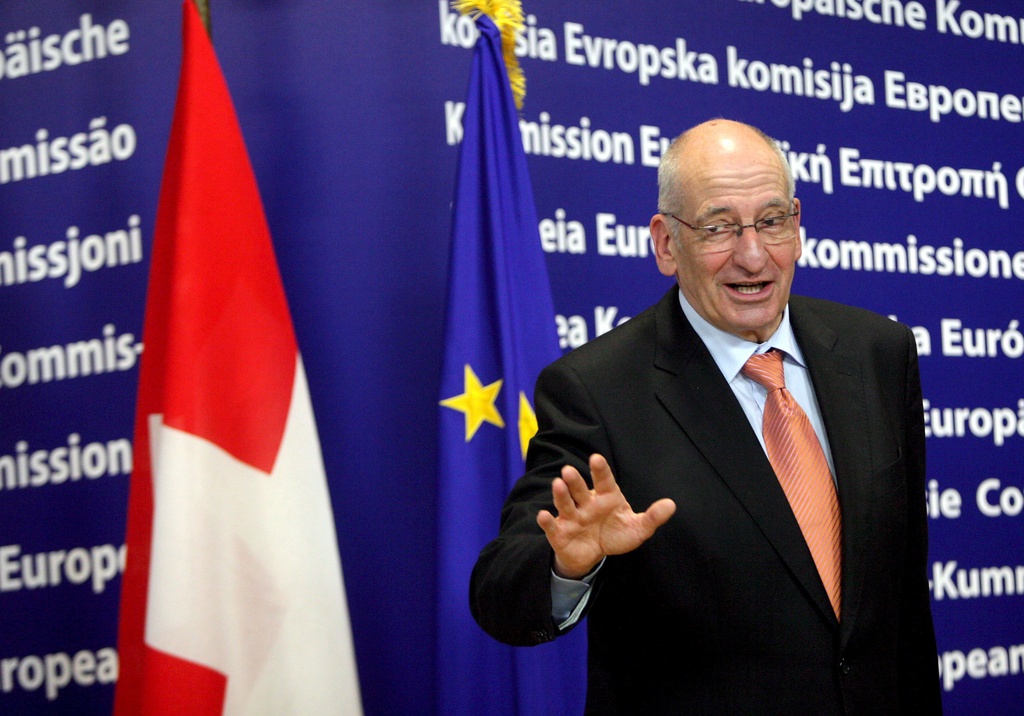Cabinet puts its EU cards on the table

The cabinet has formally responded to demands by the European Union that it submit proposals for new rules to govern the relationship between the two sides, to replace the long-standing method of bilateral accords.
Foreign Minister Didier Burkhalter said on Friday that the cabinet’s proposal to establish a national supervisory body to oversee accords had been given the green light by the cantons and parliament, and a letter outlining this proposal was on its way to Brussels.
Following consultations with parliamentary committees, cantons, political parties and organisations, the cabinet finalised its initial proposals which were published in April.
Following opposition various groups, the government in its mandate for negotiations with the EU now proposes a supervisiory body with limited powers.
The rightwing Swiss People’s Party has rejected the proposal, calling for a three-year moratorium for talks on institutional issues with Brussels.
The centre-left Social Democrats said full EU membership was the only realisitic long-term option.
Opposition
The EU, Switzerland’s largest trading partner, has repeatedly said that the method of bilateral accords, under which the two sides hammer out agreements on individual policy areas, was outdated. It wants an institutional framework to be created so that as and when necessary all accords would be adjusted to the community “acquis” – the body of EU law.
But Switzerland rejects any measure which would force it to automatically adjust to developments in EU law, seeing this as an attack on its sovereign rights.
The 27-nation EU has blocked any negotiations on future accords, in particular an agreement on energy policy, until the matter is resolved.
Burkhalter told a news conference that Switzerland is ready to accept a “dynamic development of the law”, and called for the highest courts of the EU and Switzerland to consult more closely.
He said the Swiss supervisory body would be elected by parliament to oversee the application of the accords. This would occur alongside an EU supervisory panel that already exists, and in cases where the two cannot agree, the government has proposed an arbitration mechanism involving the courts of Switzerland and the EU.
“There is no plan B if the EU rejects our proposals,” Burkhalter said. “We have put our pro-active proposals on the table. Let’s see what the EU says officially. We have invited [José Manuel] Barroso [President of the European Commission] to Switzerland. We are ready for discussions in Switzerland or in Brussels.”
Burkhalter also indicated that Switzerland might be willing to offer a compromise, but declined to give details.
Impasse
Economics Minister Johann Schneider-Ammann on Friday stressed the importance to Switzerland of finding a solution to the impasse with the EU.
He said access to the EU market was crucial to the country’s economic policy in the coming years, with one in three Swiss jobs depending on EU trade and 60 per cent of Swiss exports going to the EU.
However, observers say Brussels is unlikely to agree to the Swiss proposals, which have been circulating since April.
Last month, the EU ambassador to Switzerland, Richard Jones, said in response to the idea: “The structure is clear. There are monitoring authorities of the European Free Trade Association (Efta) and the Efta Court, which oversees legal disagreements. These tasks are not explicitly delegated to states themselves.”
Switzerland is one of the four members of Efta (including Norway, Iceland and Liechtenstein).

More
EU bilateral accords
Switzerland is not an EU member but has concluded more than 120 bilateral treaties with the 27-nation bloc.
In 1992 Swiss voters narrowly rejected the European Economic Area treaty, a half-way house to full EU membership.
In 2002 a series of major bilateral accords, notably granting access to each other’s labour markets, came into force.

In compliance with the JTI standards
More: SWI swissinfo.ch certified by the Journalism Trust Initiative















You can find an overview of ongoing debates with our journalists here . Please join us!
If you want to start a conversation about a topic raised in this article or want to report factual errors, email us at english@swissinfo.ch.